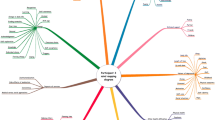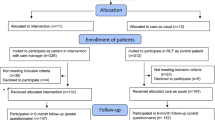Abstract
Efforts to improve primary care treatment of depression incorporate elements of the chronic illness care model, including patient self-management strategies. Case studies, focus groups and the literature suggest six key components of depression self-management programs: (1) implement behavioral change interventions, (2) plan for crisis and relapse prevention, (3) re-establish personal meaning, (4) attend to patients’ experience, context and community, (5) build a patient–clinician partnership and (6) create an integrated, self-management support structure. Successful implementation of these components is facilitated by (1) the care system’s collective and empathic understanding of the disease itself; (2) sufficient time; (3) adequate funding and (4) robust clinical information systems.
Similar content being viewed by others
References
S. Adelsheim, K. Carrillo and E. Coletta, Developing school mental health in a rural state: The New Mexico School Mental Health Initiative. Child and Adolescent Psychiatric Clinics of North America 10 (2001) 151-159
E. Badamgarav, S. R. Weingarten and J. M. Henning, Effectiveness of disease management programs in depression: A systematic review. American Journal of Psychiatry 160 (2003) 2080-2090
M. W. Battersby, Community models of mental care warrant more governmental support. British Medical Journal 329 (2004) 1140-1141
T. Bodenheimer, K. Lorig and H. Holman, Patient self-management of chronic disease in primary care. JAMA 288 (2002a) 2469-2475
T. Bodenheimer, E. H. Wagner and K. Grumbach, Improving primary care for patients with chronic illness. JAMA 288 (2002b) 1775-1779
J. Brown, M. Stewart, E. McCracken, I. R. McWhinney and J. Levenstein, The patient-centered clinical method. 2. Definition and application. Family Practice 3 (1986) 75-79
M. E. Copeland, The Depression Workbook: A Guide to Living With Depression and Manic Depression. Oakland, CA: New Harbinger Publications (2001).
K. Cronkite, On the Edge of Darkness: Conversations about Conquering Depression. New York: Delta Books (1995).
M. Danquah, Willow Weep for Me: A Black Woman’s Journey Through Depression. New York: Ballantine Publishing (1998).
S. Garfield, S. Francis and F. Smith, Building concordant relationships with patients starting antidepressant medication. Patient Education and Counseling 55 (2004) 241-246
D. Gasman, W. M. Finlay and D. Brock, Becoming a self-therapist: using cognitive-behavioral therapy for recurrent depression and/or dysthymia after completing therapy. Psychology and Psychotherapy 77 (2004) 335-351
K. Jamison, An Unquiet Mind: A Memoir of Moods and Madness. New York: Alfred A. Knopf (1995).
K. R. Lorig, P. Ritter and A. L. Stewart, Chronic disease self-management program: 2-year health status and health care utilization outcomes. Medical Care 39 (2001) 1217-1223
E. Ludman, W. Katon and T. Bush, Behavioural factors associated with symptom outcomes in a primary care-based depression prevention intervention trial. Psychological Medicine 33 (2003) 1061-1070
W. R. Miller and S. Rollnick, Motivational Interviewing: Preparing People for Change. New York: Guilford Press (2002).
H. A. Pincus, J. Knox-Houtsinger, J. Bachman and D. Keyser, Depression in primary care: Bringing behavioral health safely into the main stream. Health Affairs 24 (2005) 271-276
F. W. Platt, D. L. Gaspar and J. L. Coulehan, “Tell me about yourself”: The patient centered interview. Annals of Internal Medicine 134 (2001) 1079-1085
J. O. Prochaska, J. Norcross and C. DiClemente, Changing for Good. New York: Avon Books (1994).
A. Richards, M. Barkham and J. Cahill, PHASE: A randomised, controlled trial of supervised self-help cognitive behavioural therapy in primary care. British Journal of General Practice 53 (2003) 764-770
A. Rothman and E. Wagner, Chronic illness management: What is the role of primary care?. Annals of Internal Medicine 138 (2003) 256-261
T. L. Schwenk, D. L. Evans, S. K. Laden and L. Lewis, Treatment outcome and physician-patient communication in primary care patients with chronic, recurrent depression. American Journal of Psychiatry 161 (2004) 1892-1901
G. E. Simon, E. J. Ludman and S. Tutty, Telephone psychotherapy and telephone care management for primary care patients starting antidepressant treatment: a randomized controlled trial. JAMA 292 (2004) 935-942
J. Sirey, M. Bruce and G. Alexopoulos, The treatment initiation program: An intervention to improve depression outcomes in older adults. American Journal of Psychiatry 162 (2005) 184-186
The Chronic Disease Self-Management Workshop: Leaders Manual. Palo Alto, CA: Stanford University (1999).
Upshur, C. (2003). Assisting patients to implement positive change: Summary of principles from Prochaska, Norcross and DiClemente’s Changing for Good. University of Massachusetts Medical School, Department of Family Medicine and Community Health
E. H. Wagner, B. T. Austin, C. Davis and M. Hindmarsh, Improving chronic illness care: Translating evidence into action. Health Affairs 20 (2001) 64-78
A. Warsi, P. S. Wang and M. P. LaValley, Self-management education programs in chronic disease: A systematic review and methodological critique of the literature. Archives of Internal Medicine 164 (2004) 1641-1649
Author information
Authors and Affiliations
Corresponding author
Rights and permissions
About this article
Cite this article
Bachman, J., Swenson, S., Reardon, M.E. et al. Patient Self-Management in the Primary Care Treatment of Depression. Adm Policy Ment Health 33, 76–85 (2006). https://doi.org/10.1007/s10488-005-4238-y
Published:
Issue Date:
DOI: https://doi.org/10.1007/s10488-005-4238-y




